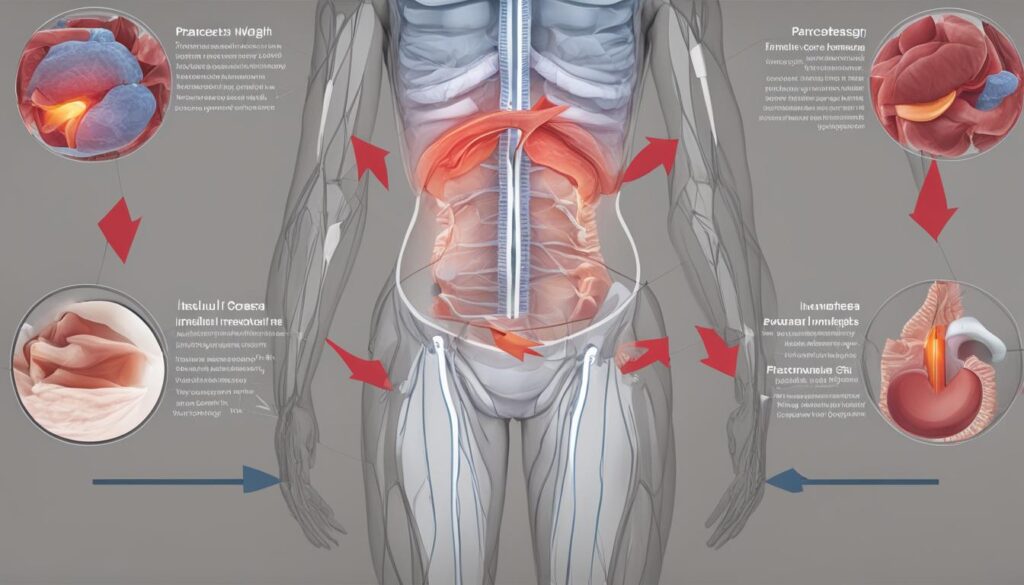Hormonal weight gain and belly fat can be a frustrating and challenging experience. The good news is that understanding the link between hormones and weight gain is the first step towards achieving a healthier, happier you. In this comprehensive guide, we will explore the impact of hormonal imbalances on weight gain and belly fat. You’ll also learn effective strategies to balance your hormones and shed pounds safely and sustainably.
Many factors contribute to hormonal weight gain, including genetics, age, and lifestyle habits. However, hormonal imbalances play a significant role in how our bodies store fat, particularly around the abdomen.
By understanding the hormonal mechanisms responsible for weight gain, you can take targeted steps to balance your hormones and promote healthy weight management.
Key Takeaways:
- Hormonal imbalances can contribute to weight gain and belly fat
- Understanding the specific hormones involved in weight gain is crucial for effective weight management
- Lifestyle factors, such as diet, exercise, sleep, and stress, can impact hormonal balance
- Professional guidance is essential for addressing hormonal imbalances safely and effectively
- Embracing a healthy lifestyle is key to achieving long-term success
The Role of Hormones in Weight Gain
Weight gain and hormones are closely linked, and imbalances in hormone levels can contribute to increased body weight and fat accumulation, especially around the abdomen. Hormones play a crucial role in regulating metabolism, appetite, and fat storage, and an imbalance in any of these factors can disrupt the body’s natural weight management mechanisms.
The Hormones Involved in Weight Gain
Several hormones are involved in regulating body weight and fat distribution, including:
| Hormone | Function |
|---|---|
| Leptin | Regulates appetite and fat storage |
| Ghrelin | Stimulates appetite |
| Insulin | Regulates blood sugar levels and fat storage |
| Cortisol | Stimulates fat storage and increases appetite |
When these hormones are in balance, the body can effectively regulate weight and fat distribution. However, when there is a hormonal imbalance, it can disrupt this delicate balance and lead to weight gain, particularly around the midsection.
The Link Between Hormonal Imbalance and Weight Gain
Hormonal imbalances can be caused by various factors, including genetics, aging, certain medical conditions, and lifestyle choices. When hormones are out of balance, it can lead to several metabolic changes that can contribute to weight gain, such as:
- Increased appetite and cravings
- Slowed metabolism
- Reduced fat burning
- Increased fat storage, especially around the abdomen
These metabolic changes can make it difficult to lose weight, even with diet and exercise. Therefore, addressing hormonal imbalances is crucial for effective weight management.

Addressing Hormonal Imbalance
While hormonal imbalances can be challenging to address, there are several strategies that can help balance hormones and promote weight loss, including:
- Following a balanced and nutrient-rich diet
- Incorporating regular exercise into your routine
- Reducing stress through relaxation techniques or therapy
- Taking medications or supplements to address specific hormonal imbalances, under the guidance of a healthcare professional
By addressing hormonal imbalances, whether through lifestyle modifications or medical interventions, it is possible to achieve sustainable weight loss and reduce belly fat.
Estrogen and Weight Gain
Estrogen is a primary female sex hormone that plays a significant role in weight gain and fat distribution. Hormonal weight gain is often characterized by an increase in belly fat, and research suggests that estrogen levels may be a key factor in this process.
In women, estrogen levels fluctuate throughout the menstrual cycle and decrease during menopause. When estrogen levels are low, women are more likely to gain weight, especially around the abdomen. Additionally, higher levels of estrogen are associated with a lower body mass index (BMI) and less belly fat.
So, how exactly does estrogen affect weight gain?
Estrogen influences weight gain in several ways. It regulates insulin sensitivity, which affects how the body stores and uses glucose. When estrogen levels are low, insulin sensitivity decreases, leading to increased glucose levels and more fat storage. Estrogen also affects the hunger and satiety hormones ghrelin and leptin, which can impact appetite and cravings.
Moreover, estrogen can influence the type of fat stored in the body. Higher estrogen levels are associated with more subcutaneous fat, which is stored just beneath the skin and less harmful to health. In contrast, lower estrogen levels are linked to more visceral fat, which is stored around the organs and can lead to health issues such as type 2 diabetes and cardiovascular disease.
Managing estrogen levels is critical for hormonal balance and weight management. Here are some strategies to support healthy estrogen levels:
| Strategies | Benefits |
|---|---|
| Incorporate phytoestrogen-rich foods | Phytoestrogens are plant compounds that mimic estrogen in the body and can help to balance estrogen levels. |
| Reduce exposure to xenoestrogens | Xenoestrogens are synthetic compounds that mimic estrogen in the body and can disrupt hormonal balance. Reducing exposure can support healthy estrogen levels. |
| Exercise regularly | Regular exercise can help to regulate hormone levels, including estrogen. |
| Manage stress levels | Chronic stress can disrupt hormone levels, including estrogen. Engage in stress-reducing activities such as meditation, yoga, or deep breathing. |

It’s essential to note that hormone balance is complex, and managing estrogen levels should be done with the guidance of a healthcare professional. In some cases, hormone therapy may be necessary to achieve optimal hormonal balance.
By understanding the role of estrogen in weight gain, we can take steps to address hormonal imbalances and promote a healthier body.
Insulin and Weight Gain
Insulin is a hormone produced by the pancreas that regulates blood sugar levels in the body. When we eat, the pancreas releases insulin, which enables our cells to use glucose as energy. However, when the body becomes resistant to insulin, the pancreas produces more insulin to compensate, leading to high levels of insulin in the bloodstream. This can contribute to hormonal weight gain and weight gain around the abdomen.
Research has shown a strong association between insulin resistance and weight gain. In fact, people with insulin resistance are more likely to store fat in the abdominal area, leading to increased belly fat. Additionally, high insulin levels can contribute to increased appetite and cravings, making it more challenging to lose weight.
To manage insulin levels and promote healthy weight management, it is essential to adopt a balanced diet that includes low-glycemic carbohydrates, lean proteins, and healthy fats. Incorporating regular physical activity and strength training can also improve insulin sensitivity, leading to better blood sugar control and weight loss.

Table: Foods to incorporate into a balanced diet for insulin control
| Food Group | Example Foods |
|---|---|
| Low-Glycemic Carbohydrates | Non-starchy vegetables, whole grains, legumes |
| Lean Proteins | Chicken, fish, turkey, tofu |
| Healthy Fats | Nuts, seeds, avocado, olive oil |
“By adopting healthy lifestyle habits and managing insulin levels, you can promote hormonal balance and achieve effective weight loss, especially around the abdomen.”
Cortisol and Weight Gain
Cortisol, often referred to as the stress hormone, can also contribute to hormonal weight gain and belly fat. When the body is under stress, cortisol is released, leading to an increase in appetite, cravings for comfort foods, and the deposition of fat around the abdomen.
According to recent studies, chronic stress and high cortisol levels are linked to an increased risk of metabolic disorders such as obesity and diabetes. High cortisol levels have also been associated with an increased risk of cardiovascular disease.
To manage cortisol levels and support healthy weight management, it is essential to adopt effective stress management techniques. These may include meditation, yoga, deep breathing exercises, or regular physical activity.
“By managing stress levels and cortisol production, you can support healthy hormonal balance and reduce the risk of hormone-related belly fat.”
In addition to stress management, nutrition also plays a crucial role in regulating cortisol levels. Consuming a balanced diet with plenty of fruits, vegetables, and whole grains can help balance cortisol levels and reduce hormone-related belly fat.
Some research suggests that specific nutrients, such as omega-3 fatty acids and probiotics, may also help regulate cortisol levels. Omega-3 fatty acids can be found in salmon, walnuts, and flax seeds, while probiotics are found in fermented foods like yogurt and kefir.

The Role of Thyroid Hormones in Weight Gain
Thyroid hormones are essential for regulating metabolism and maintaining a healthy body weight. Any imbalances in these hormones can lead to weight gain or difficulty losing weight, particularly around the abdomen. Therefore, it is crucial to understand the relationship between thyroid hormones and weight gain to address hormonal weight management effectively.
There are two primary thyroid hormones – thyroxine (T4) and triiodothyronine (T3). T4 is converted to T3 in the liver and other tissues, which is the more active hormone that affects metabolism and weight regulation.
When the thyroid gland doesn’t produce enough T4 and T3, it results in an underactive thyroid or hypothyroidism. This condition slows down metabolism and causes weight gain, among other symptoms such as fatigue and sensitivity to cold temperatures. On the other hand, an overactive thyroid or hyperthyroidism can lead to weight loss, despite increased appetite and food intake.
Several factors can contribute to thyroid imbalances, including nutrient deficiencies, autoimmune disorders, stress, and environmental toxins. Women are also more likely to experience thyroid problems, particularly after menopause.
To support thyroid health and prevent hormonal weight gain, it is essential to maintain a healthy lifestyle. Eating a balanced diet rich in iodine, selenium, zinc, and iron can help support thyroid function. Managing stress levels and engaging in regular physical activity can also support healthy thyroid hormones.
If you suspect a thyroid problem, it’s crucial to consult with a healthcare professional, such as an endocrinologist or a registered dietitian, who can order a blood test to check your thyroid hormone levels and diagnose any imbalances or disorders. Treatment options may include hormone replacement therapy, lifestyle modifications, or medication.

Overall, understanding the role of thyroid hormones in weight gain is crucial for effective weight management. By supporting healthy thyroid function through dietary and lifestyle modifications and seeking professional guidance, you can achieve hormonal balance and maintain a healthy body weight.
Testosterone and Weight Gain
Testosterone is an important hormone for both men and women when it comes to weight management. Imbalances in testosterone levels can contribute to weight gain, particularly around the abdomen.
In men, low testosterone levels can lead to increased body fat and reduced muscle mass, while in women, high testosterone levels can lead to similar outcomes. Balancing testosterone levels is crucial for maintaining a healthy body weight.
There are several strategies for optimizing testosterone levels, including regular exercise, getting enough sleep, and reducing stress. Resistance training, in particular, has been shown to increase testosterone levels and promote fat loss.
A healthy diet, rich in protein, fiber, and healthy fats, can also support testosterone production. Zinc, in particular, is a mineral that is important for testosterone synthesis. Foods like oysters, beef, and pumpkin seeds are excellent sources of zinc.

Seeking professional guidance, such as consulting with a physician or registered dietitian, can also be helpful in managing testosterone levels and promoting weight loss.
Testosterone and Weight Loss: The Evidence
Several studies have investigated the link between testosterone and weight loss. One study found that overweight men who received testosterone replacement therapy lost more body fat and gained more muscle mass compared to those who did not receive the treatment.
Another study found that women with polycystic ovary syndrome (PCOS), a condition characterized by high testosterone levels, who underwent testosterone-lowering therapy, experienced weight loss and reduced waist circumference.
These findings suggest that optimizing testosterone levels can be an effective strategy for promoting weight loss and reducing belly fat.
Lifestyle Factors and Hormonal Weight Gain
Hormonal weight gain and belly fat can be attributed to various lifestyle factors that affect our hormonal balance. The accumulation of fat around the abdomen can be a result of poor diet, lack of physical activity, inadequate sleep, and chronic stress. By making simple lifestyle changes, you can improve your hormonal balance and support healthy weight management.
Adopting a balanced diet is essential for regulating hormonal imbalances. Incorporating whole foods, such as fruits, vegetables, lean proteins, and healthy fats, can help regulate hormone levels that may contribute to weight gain around the abdomen. Avoiding processed foods, sugary drinks, and alcohol can also help regulate hormonal imbalances that lead to weight gain.
Physical activity is also a crucial aspect of maintaining a healthy body weight. Regular exercise can help regulate hormones that contribute to weight gain around the abdomen. Activities such as resistance training and high-intensity interval training (HIIT) have been shown to be particularly effective in regulating hormones and reducing belly fat.
Stress management techniques, such as mindfulness meditation and yoga, can also help address hormonal imbalances. Chronic stress can contribute to increased levels of cortisol, which can lead to weight gain and belly fat. Practicing stress-reducing activities can help balance cortisol levels and reduce the risk of hormonal weight gain.
Inadequate sleep can also contribute to hormonal imbalances and weight gain. Sleep deprivation can lead to an increase in hunger hormones, such as ghrelin, which can lead to overeating and weight gain. Aim for at least seven to nine hours of quality sleep per night to support hormonal balance and healthy weight management.
Table: Hormonal Weight Gain and Lifestyle Factors
| Lifestyle Factors | Impact on Hormonal Weight Gain |
|---|---|
| Poor diet | Can lead to hormonal imbalances that contribute to weight gain and belly fat |
| Lack of physical activity | Can contribute to hormonal imbalances that lead to weight gain around the abdomen |
| Inadequate sleep | Can lead to an increase in hunger hormones, contributing to overeating and weight gain |
| Chronic stress | Can contribute to increased cortisol levels, leading to weight gain and belly fat |
By adopting healthy lifestyle habits, you can support hormonal balance and reduce the risk of hormonal weight gain and belly fat. Making small changes, such as incorporating whole foods, regular exercise, stress management, and quality sleep, can positively impact your hormone levels and contribute to a healthier body weight.

Strategies to Balance Hormones and Shed Pounds
When it comes to hormonal weight gain and belly fat, balancing hormones is key to achieving sustainable weight loss. Let’s explore some strategies for achieving hormonal balance and shedding those extra pounds.
Dietary Modifications
The foods we eat can impact our hormones, affecting weight gain and overall health. Consider incorporating foods that support hormone balance, such as whole grains, lean proteins, and healthy fats. Avoid processed foods, sugary drinks, and foods with high levels of saturated and trans fats. Additionally, consider incorporating natural supplements, such as omega-3 fatty acids and vitamin D, to support overall health and hormone balance.
Targeted Exercise
Exercise is essential for weight loss and overall health, but certain types of exercise can also support hormone balance. Incorporate strength training to support testosterone levels and interval training to optimize insulin sensitivity. Aim for at least 150 minutes of moderate-intensity exercise per week, incorporating both cardio and strength training for optimal results.
Stress Reduction
Cortisol, the stress hormone, can contribute to weight gain and hormonal imbalances. Incorporate stress-reduction techniques, such as yoga, meditation, deep breathing exercises, or spending time in nature. Additionally, aim for at least seven hours of quality sleep each night as sleep deprivation can lead to increased cortisol levels and hormonal imbalances.
Hormone Therapy
If lifestyle modifications alone are not effective, consult a healthcare professional about the possibility of hormone therapy. This may include testosterone replacement therapy for men or hormone replacement therapy for women experiencing menopause. However, hormone therapy should only be used under medical supervision and after all other options have been explored.
With these strategies, you can achieve hormonal balance and promote effective weight loss. Keep in mind that weight loss is a journey, and it may take time to achieve your goals. Consistency is key, so stay committed to healthy lifestyle habits to achieve long-term success.

“Balancing your hormones is the key to long-term weight management. By incorporating healthy habits and seeking professional guidance, you can achieve your weight loss goals and live a happier, healthier life.”
The Importance of Professional Guidance
While making lifestyle modifications is an essential step towards achieving hormonal balance and shedding pounds effectively, seeking professional guidance is crucial for addressing hormonal imbalances safely and efficiently. Consulting healthcare professionals who specialize in hormonal health and weight management, such as endocrinologists or registered dietitians, can guide you in developing a tailored plan to address hormonal weight gain and belly fat.
Endocrinologists are medical doctors who specialize in the endocrine system and its related conditions, including hormonal imbalances. They can diagnose and treat conditions that affect hormone production and provide guidance on appropriate hormone therapies, medication, and lifestyle modifications.
Registered dietitians can work with you to develop a personalized nutrition plan that supports hormonal balance and weight management. They can advise on the appropriate balance of macronutrients, such as protein, carbohydrates, and fats, to optimize hormone production and regulate appetite.
By seeking professional guidance, you can take a more targeted and comprehensive approach to hormonal weight gain and belly fat. Working with healthcare professionals who specialize in hormonal health can provide you with the knowledge, support, and resources necessary for achieving your weight management goals safely and effectively.
Don’t forget the importance of professional guidance for your hormonal health!

Embracing a Healthy Lifestyle for Long-Term Success
To achieve long-term success in managing hormonal weight gain and weight gain around the abdomen, it is crucial to adopt a healthy lifestyle. This includes regular exercise, balanced nutrition, stress management, and adequate sleep. While it may seem daunting to make significant changes, start with small, achievable goals and build momentum over time. For instance, you could aim to exercise for 30 minutes a day, add more vegetables to your meals, or practice deep breathing for 10 minutes each day.
Regular exercise is one of the most effective ways to manage hormonal weight gain and belly fat. Aim for at least 150 minutes of moderate-intensity exercise, such as brisk walking or cycling, each week. Strength training exercises that target major muscle groups, such as squats and lunges, can also help boost metabolism and burn fat.
Healthy nutrition is another crucial component of a healthy lifestyle. Focus on consuming a balanced, whole foods-based diet that includes lean protein, complex carbohydrates, healthy fats, and plenty of fruits and vegetables. Avoid processed and sugary foods, which can contribute to hormonal imbalances and weight gain.
Stress management is also key to hormonal balance and successful weight management. Chronic stress can lead to increased cortisol levels, which promote weight gain and belly fat. Strategies such as meditation, yoga, deep breathing, and regular relaxation can help reduce stress and support hormonal balance.

Finally, getting adequate sleep is essential for maintaining hormonal balance and optimal weight management. Aim for 7-8 hours of uninterrupted sleep each night and establish a consistent sleep-wake cycle to promote healthy sleep habits. Poor sleep can disrupt hormone levels, leading to weight gain and other health issues.
By embracing a healthy lifestyle, you can support hormonal balance and achieve long-term success in managing hormonal weight gain and belly fat. Remember that small, consistent changes are more effective than drastic, unsustainable measures. Consult a healthcare professional to develop a personalized plan suited for your individual needs and goals.
Conclusion
Managing hormonal weight gain and belly fat can be a challenging journey, but it is essential for overall health and well-being. By understanding the role of hormones in weight gain, especially around the abdomen, individuals can take steps to achieve hormonal balance and reduce excess fat.
Adopting a healthy lifestyle that includes regular physical activity, balanced nutrition, stress management, and adequate sleep is critical in supporting hormonal balance for effective weight management. Seeking professional guidance from healthcare professionals specializing in hormonal health and weight management can also provide personalized solutions for individual needs.
Taking Action for Long-Term Success
To achieve long-term success in managing hormonal weight gain, individuals should embrace sustainable lifestyle changes that promote hormonal balance and overall health. This can include incorporating healthy habits such as regular exercise, balanced nutrition, stress management, and adequate sleep into their daily routine.
By taking action towards hormonal balance and implementing targeted strategies to manage hormonal imbalances, individuals can effectively shed pounds and reduce belly fat. Remember, it’s never too late to start your journey towards a healthier, happier you.
So, take charge of your health today by focusing on your hormones, adopting a healthy lifestyle, and seeking professional guidance when necessary. With the right approach, you can achieve hormonal balance and maintain a healthy body weight over time. Say goodbye to hormonal weight gain and belly fat and hello to a healthier, happier you!
FAQ
What is hormonal weight gain?
Hormonal weight gain refers to the increase in body weight or fat accumulation that is attributed to imbalances in hormone levels. Factors such as estrogen, insulin, cortisol, thyroid hormones, and testosterone can influence weight gain and fat distribution.
Why does hormonal weight gain often lead to belly fat?
Hormonal imbalances can cause the body to store excess fat around the abdomen. This is because certain hormones, like cortisol and insulin, promote fat deposition in that area. Additionally, changes in hormone production and metabolism influence the storage and distribution of fat in the body.
How does estrogen affect weight gain?
Estrogen influences weight gain by regulating fat distribution and storage. Imbalances in estrogen levels can lead to increased fat accumulation, particularly in the abdominal region. Managing estrogen levels through lifestyle modifications and hormone therapies can help address hormonal weight gain.
What role does insulin play in weight gain?
Insulin is responsible for regulating blood sugar levels, and imbalances in insulin can contribute to weight gain. Insulin resistance, a condition where the body becomes less responsive to insulin, is associated with increased belly fat. Strategies to manage insulin levels include proper nutrition, exercise, and medication if necessary.
How does cortisol contribute to hormonal weight gain?
Cortisol, often called the stress hormone, can lead to hormonal weight gain and belly fat. Elevated cortisol levels can increase appetite, cravings, and the accumulation of fat around the abdomen. Managing stress through relaxation techniques, exercise, and adequate sleep can help balance cortisol levels.
How do thyroid hormones affect weight gain?
Thyroid hormones play a significant role in regulating metabolism and body weight. When there is an imbalance in thyroid hormones, it can lead to weight gain or difficulty losing weight. Proper diagnosis and treatment of thyroid disorders are essential for managing hormonal weight gain.
What impact does testosterone have on weight gain?
Testosterone, primarily known as a male sex hormone, also influences weight management in both men and women. Imbalances in testosterone levels can contribute to weight gain, particularly around the abdomen. Optimizing testosterone levels through lifestyle changes and hormone replacement therapy can support hormonal balance.
How do lifestyle factors contribute to hormonal weight gain?
Various lifestyle factors, including poor diet, lack of physical activity, inadequate sleep, and chronic stress, can contribute to hormonal imbalances and weight gain. Making healthy lifestyle choices, such as adopting a balanced diet, engaging in regular exercise, managing stress, and getting sufficient sleep, can promote hormonal balance and weight management.
What strategies can help balance hormones and promote weight loss?
There are several strategies to balance hormones and shed pounds effectively. These include adopting a balanced diet rich in whole foods, engaging in regular physical activity, managing stress through relaxation techniques, and considering hormone therapy under the guidance of healthcare professionals. It is crucial to consult with experts specializing in hormonal health for personalized advice and support.
Why is professional guidance important in addressing hormonal weight gain?
Seeking professional guidance, such as endocrinologists or registered dietitians, is essential for safely and effectively addressing hormonal imbalances. These healthcare professionals have expertise in hormonal health and weight management and can provide personalized guidance and treatment options to support your journey towards hormonal balance and weight loss.
How can a healthy lifestyle contribute to long-term success in managing hormonal weight gain?
Embracing a healthy lifestyle is crucial for long-term success in managing hormonal weight gain and belly fat. Consistent engagement in regular exercise, adopting a balanced and nutritious diet, managing stress, and prioritizing quality sleep promote hormonal balance and support healthy weight management. Maintaining these habits over time is key to sustaining optimal weight and overall well-being.





